I hadn’t intended to stop doing these… but now that I check the last time I did a Golden Days commentary was in September. Haha, well, I will do another one now. This time, it is Volume 3.
This volume brings Kei back into the story, and things began to become more intense and even a little dark.
Chapter 12 begins with a mysterious person holding the photograph of Jin and Yoshimitsu that we saw in the first chapter. Kei is in the past too, and he is looking for the only person he would know there—his grandfather, Yoshimitsu.
By the second page, the story is back to Jin and Mitsuya. Mitsuya seems to be settling in well at school, but a classmate wants Jin to teach him to play chess in order to beat a coffeeshop owner at the game and win the affections of a waitress there. Not realizing that the way to Jin’s heart isn’t his stomach, the classmate (who remains nameless throughout this short arc) offers to pay Jin in anpan (red bean buns). Despite the pleas of several classmates, Jin refuses until Mitsuya asks him to do it.
However, Yuriko is actually the first to come into contact with the coffee shop where Kei is working. While shopping, she runs into Setsu, the waitress at the shop, kicking a man who tried to molest her out of the shop. Yuriko assists with some surprising fighting skills, and Setsu offers her a free drink. Probably worth mentioning is that the waitresses who worked at coffeeshops during this era were sometimes considered to be there more for the entertainment of the clientele than to actually work. Hence the man’s belief he can take liberties with Setsu and Yuriko’s hesitance to go inside.
There’s a brief flashback soon after Jin and Mitsuya reach the coffee shop that reveals a conversation between Mitsuya’s mother and Yoshimitsu. Mitsuya’s mother discusses her fears about Mitsuya, but Yoshimitsu admonishes her that Mitsuya will someday have to face his own obstacles and fears. Kei had helped Mitsuya work through his emotional issues, encouraging him to believe he can heal by fixing a toy car Mitsuya destroyed (Even at a young age, Mitsuya had his violent temper).
Kei is delighted to be reunited with someone from his own time, but Jin doesn’t want to let Mitsuya out of his sight. Jin is surprised to find Mitsuya comfortable with someone else (even letting Kei touch him on the shoulder). I think Jin can sense that Mitsuya trusts Kei in a way that he doesn’t trust anyone from this era—even Jin. Jin isn’t jealous of every guy Mitsuya talks to—otherwise, everyone at school would know about his feelings. Jin is usually very subtle when he flirts with Mitsuya, but Kei figures out that Jin is in love with Mitsuya during their first meeting.
Kei tells Mitsuya the story of how he came to be working at the coffeeshop. Unlike Mitsuya, Kei heard no message from their grandfather, and had no place to fall into as Mitsuya fell into Yoshimitsu’s place. Without a mission, Kei simply struggled to survive, and is eager to confirm he isn’t insane by comparing stories.
However, Kei brings up a point that Mitsuya hasn’t considered. If Mitsuya has taken Yoshimitsu’s place, then where is Yoshimitsu? Mitsuya hasn’t thought about it at all, assuming, perhaps, that he has swapped bodies or something. But Kei’s presence as an individual means that Mitsuya must be here entirely as well.
Meanwhile, Jin overreacts to Mitsuya’s long conversation with Kei, cutting his mouth on a glass and fighting with Kei over his “favorite toy.” Jin is also upset when Mitsuya won’t explain anything to him about how he knows Kei. Understandably, Mitsuya doesn’t want to tell Jin something Jin will refuse to believe, or trouble him with the enigma of the missing Yoshimitsu.
Kei’s explanation for their relationship, that Yoshimitsu saved him, is interesting to consider. Knowing that older Yoshimitsu helped both Kei and Mitsuya with their problems, it’s likely that Yoshimitsu felt a need to help troubled young men like Kei and Mitsuya due to his guilt over leaving Jin during his own troubles. It was his way of atonement for something he regretted throughout his life.
Mitsuya’s relationship with Kei infuriates Jin, who becomes determined to help their classmate defeat Kei at chess. It’s a hopeless task, of course, because Kei was tutored in chess by Yoshimitsu, and the classmate has no experience. Nevertheless, Jin focuses on this as a way to separate them forever. Jin continues to believe that Kei is romantically interested in Mitsuya, despite Mitsuya’s continual denials.
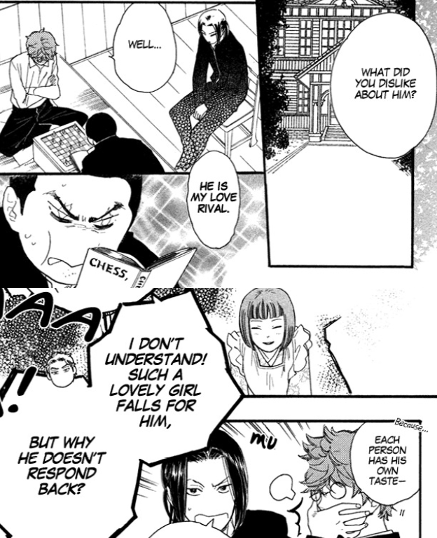
In Kei’s flashback, the date is firmly set at August 31, 1921 as the date both he and Mitsuya came to the past. The date Mitsuya returns is a little less clear, but it is a little while after the New Year 1922.
After Kei wins the chess match, Jin and Kei establish a “truce,” and they all come to the coffeeshop more often. During one visit, Mitsuya experiences a traditional street festival, which is probably a rarer sight in Tokyo today than it was in 1921. Jin misinterprets Mitsuya’s confusion about the Ebisu festival by assuming he doesn’t know who Ebisu is. (The wording here may be due to a translation from a localized translation). It would be really strange if a kid from Tokyo didn’t know who Ebisu is…
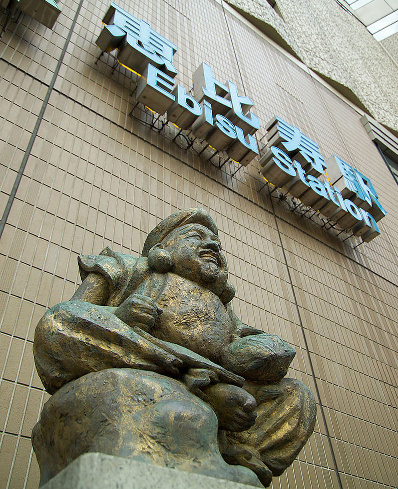
Statue of Ebisu in front of Ebisu Station, Tokyo
His musings on how various things have been forgotten or lost before his own time are the perfect prelude to his conversation with Kei. Unlike Mitsuya, Kei has been deeply considering the implications of the two of them being in the past. He worries about the possibility that he could affect history for the worse, and that he isn’t “really there.” For him, it’s much deeper than a more understandable fear of getting too attached to someone like Setsu, who he might have to leave behind.
He reminds Mitsuya about the Great Kanto Earthquake, which will happen in two years. During the earthquake, large portions of Tokyo were destroyed, mostly due to raging fires right after the earthquake. Over 100,000 people (around 2 or 3% of the city’s population at the time) died in the earthquake, and many more afterward due to conditions created by the destruction. It also affected the national mood of Japan, as many people believed the nation was receiving divine punishment for their opulent, Westernized ways. Some consider those beliefs to be the forerunner of Japan’s militaristic culture of the 30s and 40s, which led to the country’s involvement in the Second World War.
The war, too, will come soon, as Kei reminds Mitsuya. And Mitsuya’s new friends, Jin, Yuriko and Aiko, will have to live through both the earthquake and the war. Even if they survive, such tragedies would change them utterly.
Unable to bear the idea of Jin in such danger, Mitsuya rushes to his side, holding Jin to reassure himself that Jin is alive now, though a dark future may await him. History is much different when viewed through a lens of how it affects individuals, rather than as vague movements. Mitsuya has grown to care about Jin while not considering these implications.
Jin, understandably confused, asks Mitsuya to explain. When Mitsuya and Kei refuse to tell him the truth, he becomes frustrated. He wouldn’t believe the truth, even if they tried to tell him.
The floral imagery that begins in this volume grows more frequent at the series progresses. As Jin storms down the street in angry, peonies bloom behind him. While the peony is seen as a “girly” flower in the West, in the East it is associated with masculine strength, as its flowers resemble the mane of a lion. They are often used in yakuza tattoos because of this symbolism. I imagine that they are probably red peonies here. The peonies appear at later times around Jin, usually when he is passionate about something, as here.
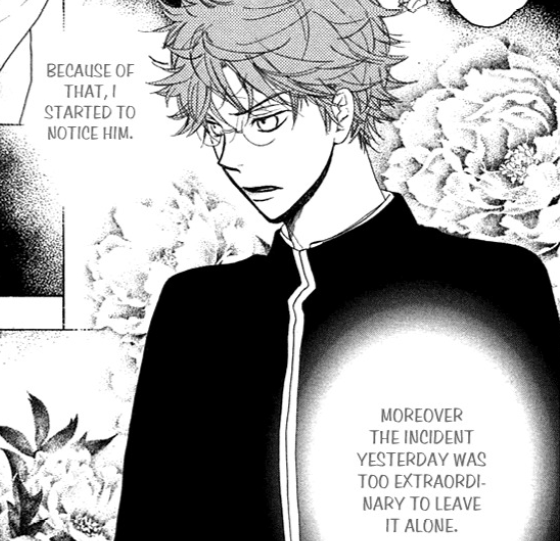
During this outburst, Jin bumps into a geisha and breaks her sandal. Being a chivalrous gentleman, Jin takes her to a restaurant and repairs her geta with his handkerchief. The ladies in the restaurant are charmed by Jin, as is the geisha. She gives him a matchbox advertising the establishment where she works before leaving in the rickshaw Jin called for her. Jin notices the stalker following her as well.
Meanwhile, at the coffeeshop, Mitsuya discusses the implications of their presence in this era with Kei. After so long ignoring this truth, it has hit Mitsuya strongly and forces him to alter the way he has been viewing those around him. He ponders if he can fulfill Yoshimitsu’s wish at all. But both of them believe that their coming here has altered things in some way.
The flowers in the backdrop of their conversation are lycoris, or spider lilies. From Wikipedia: Some other legends have it that when a person sees someone that they may never meet again, these flowers, also called red spider lilies, would bloom along the path. Perhaps because of these sorrowful legends, Japanese people often used these flowers in funerals.
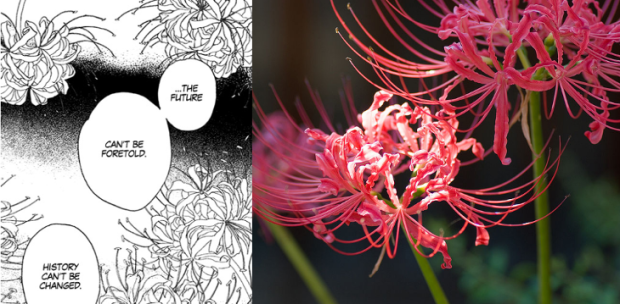
Rather ominous, no?
When Kei leaves, Mitsuya flips through the album Kei brought from the future, looking for pictures taken around the time they are now living through. He only finds three of them, the one Yoshimitsu showed him in the hospital, one very stilted group portrait, and a photograph of Jin drinking sake and listening to someone speaking beside him. Mitsuya doesn’t think it remarkable until he pries it off of the backing to read the words on the back: “Jin received his battle wound from protecting Komine of the Okinaya, Taisho Year 10 October.” Since it’s more than halfway through October now, Mitsuya rushes out in a panic to find Jin.
When he gets home, Jin asks him again about the “scary story” excuse he gave for his tears the night before. Mitsuya realizes that Jin is also worried about him, just as he worries about Jin.
When he asks Jin about the “Komine of the Okinaya” mentioned on the back of the photograph, Jin reveals that he does know her. After learning more about her, Mitsuya quickly grasps the circumstances under which Jin will be injured. The geisha has a “psycho stalker” who has sent her an eerie group photograph with only their faces left intact. She tearfully asks Jin to protect her.
Jin also notices that the geisha keeps staring at him because she has a fascination with Western things. He charms her, making her laugh with his poor singing abilities and peering at her through the holes in the photograph.
While Komine is singing for them, the stalker appears at the window. Jin formulates a plan to get Komine to safety, but he and Mitsuya dispute whether Jin should take the dangerous position of escorting her on his own. Mitsuya insists that protecting Komine is the top priority, but in reality he is most concerned with Jin’s safety.
Unfortunately, Jin is not concerned with his own safety, and jumps out of the window right before Mitsuya’s eyes to confront the stalker himself. Mitsuya rushes to get Komine to the car with enough time to spare to go back to help Jin. He’s there just as Jin is slashed by the stalker’s knife. Jin kicks and punches the stalker down before Mistuya makes it to his side.
After seeing the (fortunately light) cut, Mitsuya slaps Jin, and they get into an argument. Mitsuya rails at Jin for not allowing him to fight at his side, while Jin expresses his frustration at Mitsuya’s continual withholding of information. However, on the way home they make up, and Mitsuya promises not to lie to Jin, though he admits he won’t be able to answer all of Jin’s questions. He also vows not to leave Jin’s side when he’s in danger, a promise that will be pivotal to the ending of the manga.
To celebrate her safe escape, Komine invites the two boys to a party at the Okinaya. Mitsuya encourages the photographer who, in the original timeline, took the photograph of Jin that Mitsuya saw. However, in this version, Jin is smiling at his beloved Mitsuya, who is standing beside the photographer, rather than giving bored attention to the man speaking beside him.
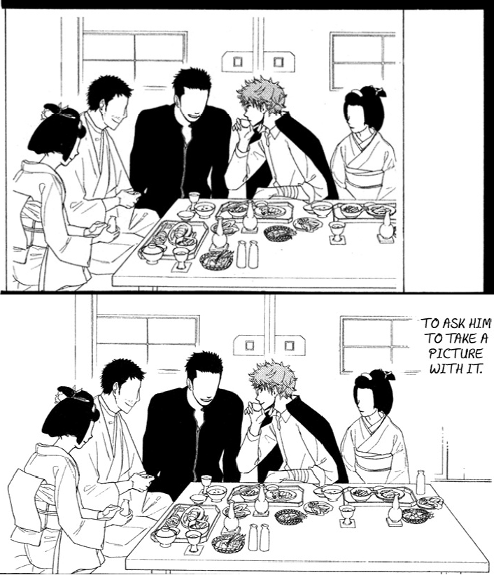
Mitsuya wonders if history can be changed in this way. In this case, he wasn’t able to actively change anything, but his presence changed Jin’s expression in the photograph, and perhaps his mood. Just being there is the best way he can change things.
Although Mitsuya doesn’t know it, he’s been changing things from the start. Once you know the characters involved, it isn’t difficult to imagine how depressed and aimless Jin must have been in the original timeline. Knowing that Yoshimitsu had actually abandoned him without a word would have shattered him as he was headed into a difficult part of his life.
Scans from Ivyscan.